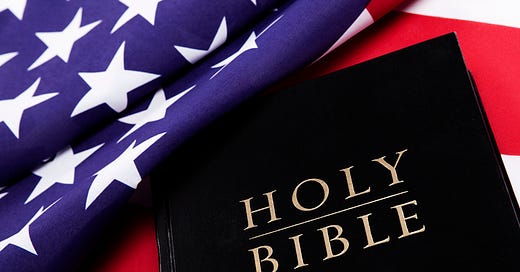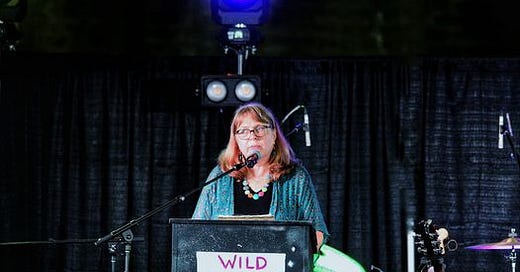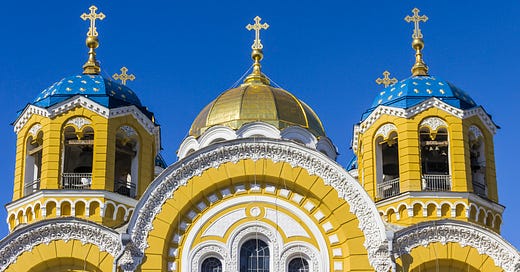

Discover more from The Cottage
Christian Nationalism Everywhere?
We've got a blunt instrument when we need a fine tool to understand religion and politics.
In the last few days, the phrase “Christian nationalism” is everywhere. The media is on fire with the term, blaming nearly every ill in American politics on Christian nationalism.
I confess: I’m not entirely on board with this. There are ways in which explaining Christian nationalism adds an important dimension to understand the conflicts in American society. However, I fear “Christian nationalism” is too blunt an instrument. In these difficult and divisive times, we need a more deft touch to overcome what is ailing to heal our communities.
The Christian nationalism discussion must be getting to me, however, because the other day I woke up with two sentences running through my mind:
America is not a Christian nation.
The United States is shaped by Christianity, especially Protestantism.
The relationship between Christianity and politics in the United Sates isn’t easily encapsulated in a phrase or a single historical explanation. Instead of letting “Christian nationalism” bear the weight of our problems, I think a better path of understanding (and possibility) is found between these two propositions — America is not a Christian nation and the United States is shaped by Christianity, especially Protestantism.
That the United States is not a Christian nation should be obvious because no nation has ever been a Christian nation — not even the political state of the Vatican! And there’s never been a truly Christian nation. Ever.
Some nations have state churches or other constitutional or cultural provisions that promote Christianity, and, in this way, have been referred to as “Christian nations.” This didn’t mean that every single person within such a country was a Christian of a particular sort. Nor did it necessarily mean that these nations were political theocracies. And it especially did not mean that nations behaved in a specifically Christian way. Mostly, nations were called “Christian” whose legal and social traditions were shaped by a particular church — and whose laws privileged a certain faith.
But is that what makes a nation Christian? Public rituals and legal traditions? State preference for a particular church? That certainly isn’t what makes a person Christian. One is Christian by virtue of baptism and personal profession (like confirmation or conversion) and who attempts — in some way — to live a life in imitation of Jesus and his teachings.
If a country aspires to being a “Christian nation,” the ideal would be to combine both — the public and legal with the personal and moral. You’d have constitutional provisions to protect and extend a particular religion, and you’d have a majority populace of true believers (with some flexibility for backsliders and the lax) whose individual actions would embody the teachings of Jesus.
Plenty of utopian thinkers have attempted to create this very thing in America, from the Puritans who colonized New England through Mormons in Utah to liberal Protestants with their moral crusades to perfect democracy, as well as hosts of smaller groups and less memorable communities. And all these attempts failed to create a Christian nation — often miserably.
Despite that, this impulse made its way into America’s spiritual DNA — making the quest for a Christian America a little like the quest for the Holy Grail. There once was a Christian nation that was betrayed and lost. And true believers must rebuild and restore the Kingdom of God in America.
The latest iteration of this mythic understanding of American destiny was reborn among evangelicals in the 1970s. Against a background of social diversity, the sexual revolution, and widening conceptions of human rights, came a wave of religious revival. But these new evangelicals weren’t content with just saving souls. They saw the changes as a threat to American piety, and they turned their attention to converting the political order. They believed that America had once been a Christian nation — and that that nation had become secular, corrupt, and sinful, and was turning its back on God.
The dream of a Christian America became part-and-parcel of the theology and lived experience of millions of white evangelicals.
There have been softer and harder forms of “Christian nation-ism” among white Christians since America began. The softer forms have most often been a kind of flag-waving patriotism (such as during WWII) or the impetus behind meaningful social reforms.
But “Christian nation-ism” sometimes metastasized into “Christian nationalism.” These harder forms have always been ugly expressions of exclusive national identity — accompanied with violence against Jews, Catholics, Blacks, and Asians — that conflate ethnicity, Protestantism, particular notions of masculinity, and a crusading spirit into a toxic political stew. Usually, Christian nationalism has been confined to cranks, smaller political parties, yet, at times, it spawns cultural movements of some size and influence.
This distinction — between Christian nation-ism (believing in a utopian myth of a Christian America, admittedly a myth with many bad historical consequences) and outright Christian nationalism (forging an exclusivist political movement based on racial and religious purity) — is one of the tools needed to actually stop the mutation of softer forms of Christian nation-ism into outright theocratic authoritarianism of Christian nationalism.
I’m willing to bet that those of us who are worried about Christian nationalism being promoted by people like Tucker Carlson and Marjorie Taylor Greene might even find some allies among white evangelicals who would be grateful for even a shard of nuance right now.
* * * * *
And that brings me to the second proposition — that the United States was, indeed, shaped by Christianity, most especially Protestantism.
While the Christian utopians never succeeded in making America a Christian nation, they did something I’m sure they never intended. They turned the American colonies into a kind of hothouse laboratory for religious diversity and experimentation.
Whenever a particular community or colony or settler group got too rigid or dogmatic in its beliefs, people moved. They went to other colonies, joined other religions, or started their own. Colonial charters preferring and privileging one faith over others could barely keep up. New arrivals came from a dizzying variety of European churches — they were dissenters of all sorts, questioners and skeptics, religious outsiders and outcasts. This unprecedented religious rabble pressed against generally weak local governments, making enforcement of church establishments increasingly difficult. And, frankly, most settlers were far more concerned with things like surviving — and making money — than doctrinal purity.
Even in places with robust religious establishments, like Puritan Massachusetts and Anglican Virginia, second-and-third generation colonists proved more lax in faith than the memory of pious forebears, and stretched religious rules against such things as church attendance and Sabbath-keeping to the breaking point. No European colony modeled either Christian charity or Christian morals (ask the Native tribes and those enslaved) in any believable fashion. Colonial clergy were, for the most part, second-rate, given the far distance from their Europeans bishops and theological authorities, and the church was often the career choice for dull younger sons and scoundrels. Early American Christianity — especially early American Protestantism — was diverse, decentralized, and often, demoralized. At the time, Catholic critics looked to the American colonies to prove the dismal nature of Protestant societies — and predicted their imminent failure.
But this ragged bunch of Protestants, hailing from all over Europe and nearly every kind of church imaginable, shared two things that would make a tremendous difference in American history — the Bible and a deep commitment to individual conscience.
America may never have been a Christian nation, but America’s first book was the Bible. Protestants loved the Bible. The Bible is the icon of faith. It was often the only book owned by a family, sometimes the only book in an entire village or town. The Bible was the source of meaning, a guide in times of trouble, a scientific and farming text, and a history of the human race. Millions of Americans learned to read through its pages, and they tracked generations of their own families on its leaves. They interpreted the landscape through its lyrical passages — America was the land of milk and honey. They identified themselves as God’s New Israel. The settlers believed the Indigenous peoples to be the Canaanites; those they held in slavery as the descendants of Cain. They’d weave together the Bible with classical myths and Enlightenment philosophy to create their new political order. They’d preach the Bible, or they’d ridicule it, cut out the bits they didn’t like, translate it into innumerable languages, rewrite it in their own words, and add their own testaments to the traditional two. They’d twist it, argue over it, use it to justify terrible evils, and follow its noble precepts to create a more just society. No matter how many other books would arrive on American shores, and how many books Americans themselves would write, the Bible was always the first book among them all.
America wasn’t a Christian nation. But it was a nation infused with biblical imagery, biblical imagination, and biblical language — and all the pitfalls and promises accompanying Protestant bibliolatry. Just because you lean on — and perhaps even worship — the Bible, it doesn’t mean you necessarily get it right. And, if you are a Protestant, you know that few people will agree with what you think it means. Protestantism is a contentious and argumentative faith, not one of obedience or submission.
That’s because of the Protestant emphasis on individual conscience. Here I stand. I can do no other. That each person should — and must — read the Bible for him-, her-, and themselves. Freedom of religion, soul liberty. The basis of Protestantism is the right to protest against any institution, tradition, or authority that places itself between you and God — or that insists that it alone is the voice of God.
Of course, this can lead to individualism run amok. Every American knows the ugly underbelly of individualism, and how fractured we have become because of egotistic notions of personal autonomy. Yet, individual conscience is at the heart of Protestant notions of human rights and morality. In the United States, John Wayne and Martin Luther King, Jr. both employed Protestant ideals of the dignity and freedom of the individual — one in the direction of radical self-reliance and the other toward mutual responsibility — and both represent aspects of American identity. (You might also think of Ronald Reagan and Jimmy Carter.) The United States is known for both. Despite John Wayne, however, the classical vision of Protestant conscience leads from the individual back to community, creating a complex moral framework for both independence and interdependence. At its very best (a best that sometimes has happened in history), the more nuanced Protestant formulation of freedom and responsibility has been the genius behind American politics.
Protestantism is part of us. Language, literature, and imagination. Identity, laws, and social vision. American Protestantism, in all its messy, decentralized diversity, constant disagreements and reforming fervor, is just there — we are a nation shaped in conversation with a book we rarely read now and a notion of individual liberty nearly forgotten.
Not a Christian nation. But a country formed, in significant part, by an upstart, brawling religious tradition whose genius would be its capacity for diversity — and its power to demonstrate both the worst and best of human nature.
* * * * *
America is not a Christian nation. It is, however, a country where a considerable number of people hold out a mythic hope for such. And the myth too often mutated into something dangerous, a recurring ethic-religious crusade for white Protestants to maintain power and control others, that which can be called Christian nationalism.
But there also exists another reality — Protestantism, in all its unwieldy diversity, shaped how myriad millions of Americans learned, imagined, interpreted, and argued through the words of an ancient religious text, the book that still jangles the cord of memory. And the United States continues to wrestle with the most radical insight of the Protestant Reformation: Here I stand. American politics is marked by a never-ending tension between conscience and community, between freedom and mutual responsibility. Not a Protestant nation, but a nation whose imagination and identity were shaped by an engagement with Protestant diversity and ideals.
Both of these things are true. America is not a Christian nation. And the United States was shaped by Protestantism. To recognize such nuance — a kind of theo-political paradox — moves us past dangerous myths and simplistic solutions. But this isn’t just an academic exercise. Holding these two truths, we find ourselves in the midst of the same messy, argumentative history that our ancestors inhabited — we are far from perfect, sinful even, yet we are still compelled by a sacred call of grace and the dignity of conscience. Indeed, American history is almost a paraphrase of the Apostle Paul — we do the very thing we hate, even while pressing toward the good.
And, in that, we might find our way out of this dangerous moment and defeat not only Christian nationalism but the other -isms ailing the national soul.
INSPIRATION
O, let America be America again—
The land that never has been yet—
And yet must be—the land where every man is free.
The land that’s mine—the poor man’s, Indian’s, Negro’s, ME—
Who made America,
Whose sweat and blood, whose faith and pain,
Whose hand at the foundry, whose plow in the rain,
Must bring back our mighty dream again.
Sure, call me any ugly name you choose—
The steel of freedom does not stain.
From those who live like leeches on the people’s lives,
We must take back our land again,
America!
O, yes,
I say it plain,
America never was America to me,
And yet I swear this oath—
America will be!
— Langston Hughes, from “Let America Be America Again,” please read the ENTIRE poem here.
On August 4, the Cottage celebrates its first birthday as a reader-supported publication. Although I started this newsletter on Substack in May 2020, it wasn’t until August 2021 that I invited you all to contribute financially to this project.
In the year since, the Cottage has posted midweek essays on religion and culture that have been viewed more than a million times, delivers a Sunday reflection on a biblical text, hosts a monthly Zoom gathering and author conversations, has sparked national conversations on issues such as the role of religion in the Ukraine war, and raised important questions about churches and technology in the pandemic. Every week, I receive replies and emails from people around the world who are encouraged, challenged, and informed by the Cottage. (More than 170,000 readers responded in some way to the recent Mary Magdalene piece!)
Through all this work and encouraged by your remarkable response, I’ve stayed committed to the central purpose of the Cottage — to make space for heart-felt and thoughtful Christian faith that is hospitable, generous, and surprising.
To everyone here, whether you are an occasional reader (through a shared post or via social media), are on the free email list, or a paid subscriber: THANK YOU. THANK YOU ALL.
No church pays me, no ads support this work, no algorithm stalks you here. You make this possible. You motivate me, you inspire me, you keep me writing. And you are making a difference not only in my life and vocation, but to and for each other.
If you are an occasional reader, I invite you to subscribe and receive the Cottage directly to your email.
If you are a free subscriber, I invite you to consider upgrading to financial support. Paid subscriptions are $5 a month or $50 a year (there’s also a “cultivating option” of $150). There’s no increase. Unlike nearly everything else, I refuse to raise the price!
If you are a paid subscriber, I invite you to continue your financial support this year. The good folks at Substack tell me that if you set up automatic renewal, you don’t have to do anything. If you didn’t set that up when you subscribed, you’ll get a renewal notice about a week in advance of your renewal date. Keep an eye out for renewal notices (or be aware that an automatic renewal charge may show up on your credit card!) in your email. Renewals will begin on August 4.
















I am a Presbyterian Minister. To me our faith is about compassion and justice. The words of Meister Eckhart: "The person who understand what I have to say about justice understands everything I have to say." Julian of Norwich is clear, "God is justice." Let us ask ourselves: "Has America been fair and just with the Indians, and with the slaves? Remember: "Do justice, love kindness, walk humbly with God." Amos.
Wow! This is like a supplement to 'Christianity After Religion', which I'm reading now.
Maybe time for an update since that was written 10+ years ago.
Just a suggestion!